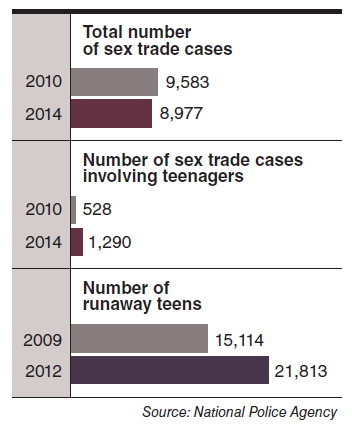Earlier this year, a local investigative TV program featured the story of a 19-year-old who died from cirrhosis, after years working as an illegal sex worker.
The report revealed the teenager had run away from home after falling victim to sexual violence at 12 years old. Her alcoholic father, a single parent, had been physically abusive. She soon became involved in juvenile crime, habitually intoxicated with alcohol, and was eventually forced by other runaway teens to sell herself for money.
The late teen was just one of some 200,000 teenagers who are estimated to run away from home every year, with the number growing.
Statistics show that illegal sex trade involving teenagers is rising, in conjunction with the rising number of runaways, as the country struggles to clamp down on the sex industry.

CCTV footage shows a murder suspect (left) and his teenage victim entering a motel in Seoul last month. The two reportedly met via a mobile messaging application for prostitution at the property, where the victim was later found dead. (Yonhap)
Korean law currently stipulates that both purchasing and selling sex carries a one-year penalty in prison or a fine of up to 3 million won ($2,767). Buying sex from the underage carry a heavier penalty of one year and 10 months in prison or a fine of up to 50 million won ($46,310).
Despite the penalties, the number of sex trade cases that involve teenagers more than doubled from 528 in 2010 to 1,290 in 2014, while the total number of sex trade cases dropped ― from 9,583 to 8,977 ― in the same time period, according to data released by the National Police Agency.
The number of teens who ran away from home also increased between 2009 and 2012, from 15,114 to 21,813. The government predicts that figure would reach 200,000 if it counted those who ran away from home but were not reported by their parents or guardians. As of 2013, 60 percent of teens who were forced into prostitution were runaway teens.
New Politics Alliance for Democracy Rep. Nam In-soon said one of the reasons behind the increasing number of teens involved in the sex trade has to do with the government’s poor regulation of the Internet and smartphone use.
As of 2010, about 80 percent of the sex trade with teenagers was pre-arranged online, mostly using instant messaging applications on smartphones, which makes it harder for authorities to crack down on.
According to Nam’s office, 717 mobile applications were involved in the illegal sex trade in 2013. “Among 182 of the apps involved in the sex trade, 65 percent did not require their users to register their age, and 96 percent were free applications for anyone to use,” she said in a statement.
Lax regulations against managers of accommodation widely used for illegal sex trade was also considered a factor.
In March, the murder of a middle school girl by a man in his 30s at a motel room in Seoul received heated news coverage. The victim reportedly met the suspect for prostitution via a mobile messaging application.
Following the arrest of the suspect, a group of female lawyers filed a request to police to investigate the owner of the motel.
“It is illegal for motel owners to let teenagers stay in their property without checking their ID,” said Kim Bo-ram, from the Korean Women Lawyers Association.
“But 65 percent of sex trade cases involving teenagers take place in motels, according to data released by the Gender Equality Ministry.”
Local studies have shown that female teens are more likely to run away from home and turn to sex work than their male counterparts. In 2010, 13,462 female teens ran away from home, compared to 8,825 male teenagers, according to the National Police Agency data.
Among the 175 female runaway teens surveyed by the Seoul Metropolitan Government in 2012, 41 percent said they had been sexually abused at least once in their lives, while 55.3 percent said they were involved in the illegal sex industry.
“The studies show that sexual violence and underage prostitution are linked to each other,” said Kim Nan-hee, a Gwangju-based activist for youth rights. “This tells us that we need to look at the two issues together, rather than simply trying to combat sex trades.”
By Claire Lee (dyc@heraldcorp.com)


![[Exclusive] Korean military set to ban iPhones over 'security' concerns](http://res.heraldm.com/phpwas/restmb_idxmake.php?idx=645&simg=/content/image/2024/04/23/20240423050599_0.jpg&u=20240423183955)

![[Graphic News] 77% of young Koreans still financially dependent](http://res.heraldm.com/phpwas/restmb_idxmake.php?idx=645&simg=/content/image/2024/04/22/20240422050762_0.gif&u=)


